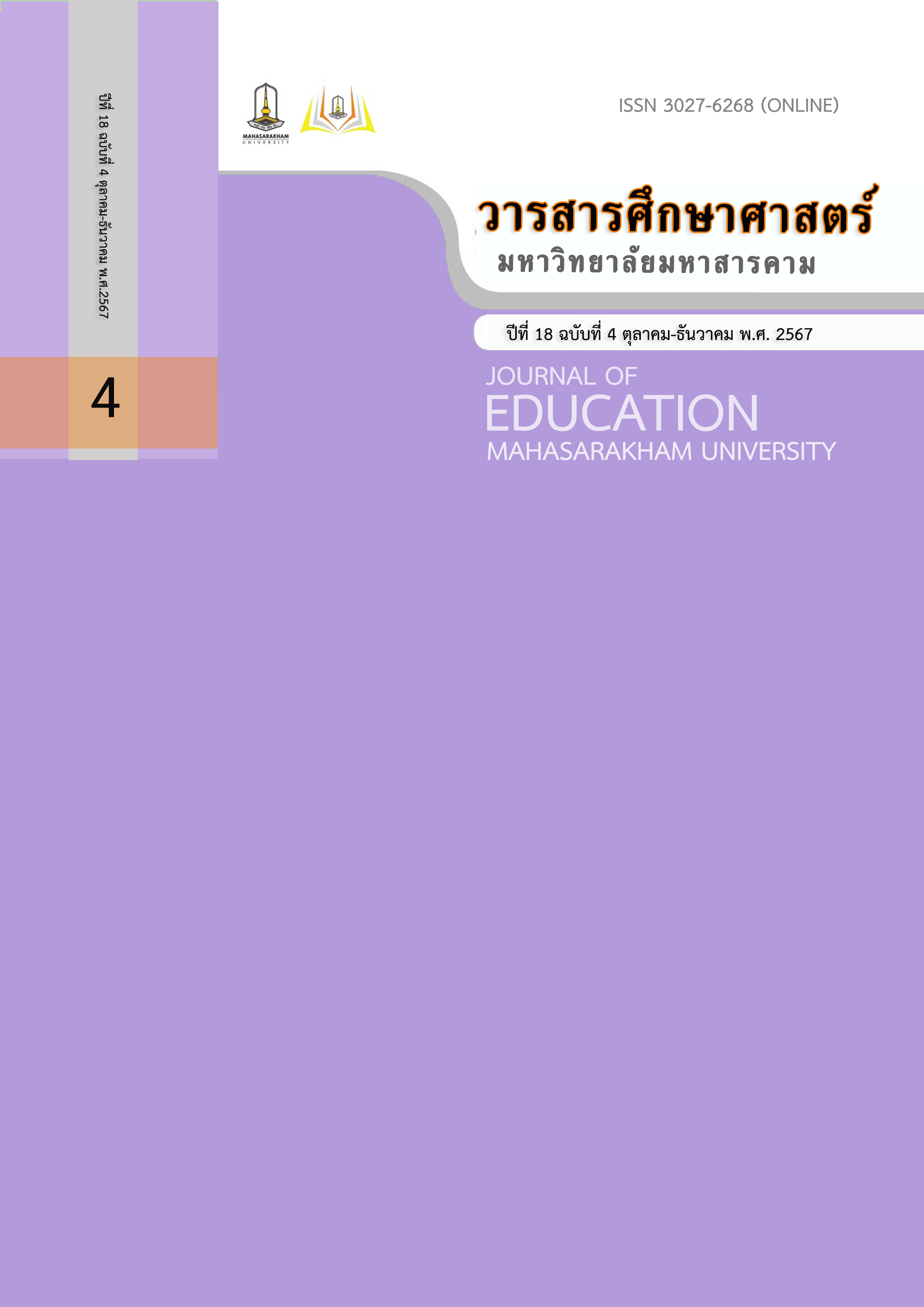การพัฒนาระบบการออกแบบและผลิตรายวิชา MOOCs สำหรับกำลังคนพื้นที่ระเบียงเศรษฐกิจพิเศษภาคตะวันออก
Main Article Content
บทคัดย่อ
การวิจัยมีวัตถุประสงค์เพื่อ1)สร้างระบบการออกแบบและผลิตรายวิชาMOOCs 2) ทดสอบระบบการออกแบบและผลิตรายวิชาMOOCs 3)ประเมินและรับรองระบบการออกแบบและผลิตรายวิชาMOOCs โดยมีขั้นตอนการวิจัย ระยะที่1การสร้างระบบการออกแบบและผลิตรายวิชาMOOCs แหล่งข้อมูลได้แก่ กลุ่มบุคลากรทางการศึกษาจำนวน 400 คน กลุ่มผู้ทรงคุณวุฒิและผู้มีส่วนได้ส่วนเสีย จำนวน 15 คน เครื่องมือที่ใช้คือ แบบสอบถาม แบบสัมภาษณ์ แบบประเมินร่างระบบ ระยะที่2 การทดสอบระบบ แหล่งข้อมูลได้แก่ บุคลากรทางการศึกษาจำนวน 15คน เครื่องมือที่ใช้คือ ระบบการออกแบบและผลิตรายวิชา MOOCs, แบบประเมินความรู้ความเข้าใจ แบบสอบถามความพึงพอใจ ระยะที่ 3 การประเมินและรับรองระบบ แหล่งข้อมูลได้แก่ กลุ่มผู้ทรงคุณวุฒิจำนวน 5 คน เครื่องมือที่ใช้คือ แบบบันทึกการสัมมนาอิงกลุ่มผู้เชี่ยวชาญ และแบบประเมินรับรองระบบ
ผลการวิจัยพบว่า 1.กำลังคนพื้นที่ระเบียงเศรษฐกิจพิเศษภาคตะวันออกมีความต้องการระบบการออกแบบและผลิตรายวิชาMOOCs โดยรวมอยู่ในระดับมาก ( = 3.96),(S.D.=.60) ระบบการออกแบบและผลิตรายวิชาMOOCs มีส่วนประกอบ 1)หลักการและเหตุผล 2) วัตถุประสงค์ของระบบ 3) หลักการและทฤษฎีในการพัฒนาระบบ 4)บริบท 5) องค์ประกอบระบบ ได้แก่ ปัจจัยนำเข้า กระบวนการ ผลลัพธ์ และผลย้อนกลับ 2.การทดสอบระบบการออกแบบและผลิตรายวิชาMOOCs สำหรับกำลังคนพื้นที่ระเบียงเศรษฐกิจพิเศษภาคตะวันออก กลุ่มผู้ใช้ระบบมีความรู้ความเข้าใจ โดยรวมอยู่ในระดับมาก ( = 3.76),(S.D.=.59)และมีความพึงพอใจโดยรวมอยู่ในระดับมาก (
= 3.63),(S.D.=.58) 3.การประเมินและรับรองระบบการออกแบบและผลิตรายวิชาMOOCsสำหรับกำลังคนพื้นที่ระเบียงเศรษฐกิจพิเศษภาคตะวันออก ผู้ทรงคุณวุฒิส่วนมากเห็นด้วยกับทั้งสี่ประเด็นหลัก โดยมีระดับความคิดเห็นโดยรวมอยู่ในระดับมาก (
= 4.35),(S.D.=.41)
Downloads
Article Details

อนุญาตภายใต้เงื่อนไข Creative Commons Attribution-NonCommercial-NoDerivatives 4.0 International License.
เอกสารอ้างอิง
เกรียงศักดิ์ เจริญวงศ์ศักดิ์. (2562). การสร้างระบบออกแบบที่ดีเพื่อออกแบบระบบที่ดี.สืบค้นเมื่อ 19มิถุนายน 2566,จาก https://www.kriengsak.com/Creating-a-good-design-system-To-design-a-good-system
ชัยยงค์ พรหมวงศ์. (2553). การจัดระบบทางการศึกษา หน่วยที่1ระบและการจัดระบบ.นนทบุรี:มหาวิทยาลัยสุโขทัยธรรมาธิราช.
แมนเพาเวอร์กรุ๊ป. (2564). แมนพาวเวอร์ แนะใช้ 3R รีบูท "ทักษะ" รับ ศก.ฟื้นแบบตัว K.สืบค้นเมื่อ 20 มิถุนายน 2566,จาก https://www.thansettakij.com/general-news/478756.
วริยา เย็นเปิง และ ธีราทัต พงศ์ลดาภัช .(2563).การพัฒนาระบบจัดการเรียนการสอนแบบเปิด.การประชุมวิชาการระดับชาติ ครั้งที่ 5 มหาวิทยาลัยราชภัฏกาญจนบุรี,(น.272-280).กาญจนบุรี:สถาบันวิจัยและพัฒนา มหาวิทยาลัยราชภัฏกาญจนบุรี.
ศิวัช กาญจนชุม. (2559). ระบบสารสนเทศเพื่อการจัดการ. กรุงเทพฯ: กรุงเทพฯ : จิตรวัฒน์.
สำนักงานคณะกรรมการนโยบายเขตพัฒนาพิเศษภาคตะวันออก. (2561). แผนภาพรวมเพื่อการพัฒนาเขตพัฒนาพิเศษภาคตะวันออก (พ.ศ. 2560 - 2565).สืบค้นเมื่อ 30 มีนาคม 2567,จาก https://www.eeco.or.th/th/filedownload/1478/cf4092afd2456bb1f03995574db27a75.pdf
สำนักงานคณะกรรมการนโยบายเขตพัฒนาพิเศษภาคตะวันออก. (2565). รายงานประจำปี2565.สืบค้นเมื่อ 12 เมษายน 2567,จาก https://eeco.or.th/th/annual-report-th
สำนักงานสภานโยบายการอุดมศึกษา วิทยาศาสตร์ วิจัยและนวัตกรรมแห่งชาติ. (2565). รายงานการส่งเสริมการเรียนรู้ตลอดชีวิต (Lifelong learning) เพื่อรองรับการพลิกโฉมฉับพลันและวิกฤตการณ์โลก.กรุงเทพฯ: พริ้นท์เอเบิ้ล.
Edwards, P. (1985). System analysis design and development: With structured concepts. New York : Holt Rinehart and Winston.
Noe, R A. (2002). Employee Training and Development. New York: McGraw-Hill.
Oleksandr (2024). 7 Edtech Trends That Will Be Cultivating Passion For Knowledge In 2024. Retrieved April 10, 2024 from https://www.forbes.com/sites/forbestechcouncil/2024/02/16/7-edtech-trends-that-will-be-cultivating-passion-for-knowledge-in-2024/


